Text
i had someone follow me and im me to ask if i was interested in writing on my main, only i went to their blog and can’t find any information about anything.
#[ like that's sweet of you but i can't even find a rule set let alone info on a muse ]#[ they are clearly a prolific writer but i can't with situation ]#[ going to bed ]#𐩐 ᚌ 。 tbd ── ooc.
8 notes
·
View notes
Text
PLEASE send me character development questions.
I love to get insightful about my character and to ramble on them. Ask me about their habits, thoughts, relationships! Go as deep and complex as you like! And send as many as you like so loads.
6K notes
·
View notes
Text
macbeth being both cunning and a giant himbo.
1 note
·
View note
Text
“As long ago as 1975, A. A. M. Duncan wrote that ‘if we set aside the fourteenth century phantasies of Fordun we might see Malcolm II as an unsuccessful ruler who lost control of northern Scotland to the rulers of Moray’. If this assessment is correct — and it should be noted that it is only in Máel Coluim II's reign that we definitely have alternative claimants to the title rí Alban in the Irish chronicles — then one might wonder whether it is a coincidence that this disputation and division in the kingdom arises at precisely the point at which Clann Custantín meic Cináeda set aside the custom of alternating kingship. If Findláech mac Ruaidrí's claim to the kingship was indeed an attempt to maintain the tradition of the alternating lineages, then one must ask, what was the relationship be tween Clann Áeda and Clann Ruaidrí?”
Alex Woolf, ‘The “Moray Question” and the Kingship of Alba in the Tenth and Eleventh Centuries,’ in The Scottish Historical Review, Vol. 79 No. 208, pp. 154-155.
#[ some casual thoughts on the political situation and McB's claim to the throne ]#𐩐 ᚌ 。 readings ── ooc.
0 notes
Photo
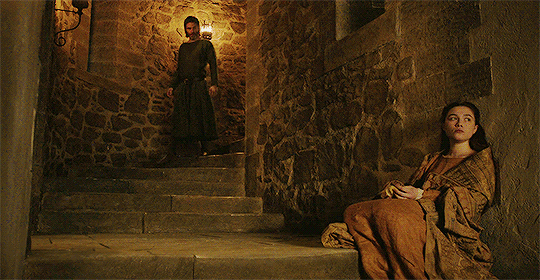
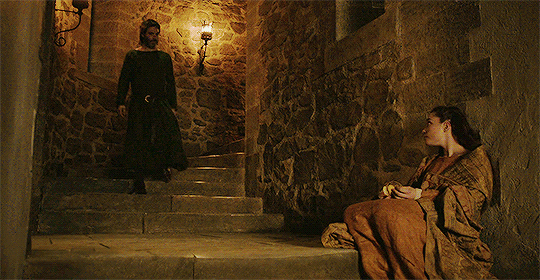




Chris Pineand Florence Pugh in Outlaw King (2018)
510 notes
·
View notes
Text
i’ve got a feeling that for the purposes of this story gille was one of those terrible types of men who is both dangerous and a coward.
#[ if that wasn't obvious from the idea of him trying to trade the life of his teenaged wife for his own ]#𐩐 ᚌ 。 ch. thoughts ── ooc.
0 notes
Text
gru likes her first husband about as well as any woman likes a man who is 20+ years her senior who she has been made to marry and who is clearly only out for himself.
that is to say, not at all.
0 notes
Photo
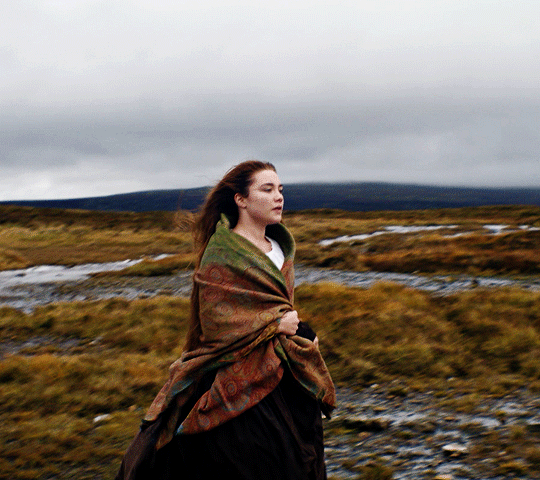



LADY MACBETH (2016), dir. William Oldroyd / OH, THE WILD, WILD MOORS (1800′s), writ. Edwin Waugh
4K notes
·
View notes
Text
thoughts and feelings about macbeth believing he is the best man to be king, instead of just the eldest and most direct heir.
1 note
·
View note
Text
“…Intercession was a powerful tool exercised by medieval queens which was based on the imagery of a familial bond, as well as the manipulative power of women. Lois Huneycutt revealed the 'idealized formula for running a proper palace' as expressed by medieval author Sedulius Scotus, who 'portrays the queen as a woman of wisdom, a benevolent maternal figure whose advice will be sought and whose words will carry weight'. This role of intercessor made the queen a powerful and accessible figure. In other words, as Pauline Stafford wrote, 'the intercessor is approachable, yet at the same time sufficiently a part of the mechanisms of power to be efficacious. Negotiation, patronage, and mercy are all aspects of intercession.'
Upon being approached by a supplicant, the intercessor might either intercede with the king on the supplicant's behalf or, dependent upon the intercessor's own authority, issue a grant favoring the individual or organization. A possible example of intercession through charters can be seen in the dates of acta, insofar as it is possible to date them, of Matilda of Boulogne. While Matilda of Boulogne supported four beneficiaries, more than any of the others favored in her acta, most of the charters for these beneficiaries were issued in groups. For instance, three of the four charters found issued by Matilda of Boulogne relating to the Holy Trinity Priory, London, were dated 1147.
The remaining charter was issued sometime between 1139 and 1146. Similarly, of the four charters she issued to the Templars, two were from between the spring of 1137 and the fall of 1138, and the final two between 1146 and 1149. That a queen would issue multiple charters at the same time, each supporting the same religious house, suggests that the abbey in question asked the queen to intercede on its behalf. Similarly, one may speculate that, the fact that the religious houses would approach the queen, demonstrates that she was seen to have authority.
Intercession can be seen in the activities of other queens, as well. Huneycutt wrote that Matilda of Scotland presented 'an example of a medieval queen who fully realized the power and influence she could wield if her subjects perceived her to be successful in interceding with her royal husband'. A representative case of this is seen in a letter to Matilda from Pope Pascal II, quoted by Huneycutt. The pope wrote to the queen asking her to '"turn the heart of the king away from the bad advice" of his "evil counselors"' through a form of gentle nagging. Although the pope was clearly not one of her subjects, that he would appeal to Matilda implies that she was seen to have direct influence over her husband.
One thing that stands out here is that, contrary to what one might expect, the clergy and even high-ranking church officials actively sought and accepted political gifts from women. Provided they received what they requested, the source was less important, which presupposes a high level of authority on the part of the queen, in this case Matilda of Scotland. One might say that the authority of the queen stemmed from her ability to deliver. Regarding intercession, this ability is the result of the queen's 'intimate relationship with the king's body, a body which itself can be twofold, a physical and an official body, king and kingship'. Because of this proximity, a queen was an approachable figure, with the authority to fulfill requests made to her, by interceding to her husband.
To jump from the role of the queen-consort to that of a queen-regnant, Empress Matilda's pattern of issuing charters is more similar to that of a king than those already examined, in that she issued substantially more charters than the other queens and that her charters were divided between religious institutions and individuals, secular and clergy. These were issued predominantly during her struggle with Stephen, between 1139 and 1144, at a time when she was trying hardest to establish herself as queen of England. She was more likely to have issued charters in favor of those who supported her in her claim to the throne, or to use charters to buy support, and so one finds multiple charters granted to Miles of Gloucester and Geoffrey de Mandeville and his heirs, as well as several for abbeys in Oxford during the time that it was under her control.
After the death of her father, despite having taken oaths of fealty from his vassals, Empress Matilda was unable to claim the English throne immediately. Instead, Henry I's nephew Stephen, with the support of his brother, Bishop William of Winchester, had himself crowned within a month of the king's death. The ensuing conflict between King Stephen and Empress Matilda divided the church and the Anglo-Norman nobles between the two claimants, with some repeatedly reversing their loyalty. Miles of Gloucester was a sheriff in the earldom held by Empress Matilda's half-brother, Robert of Gloucester. Although he originally swore fealty to Stephen, Miles championed Empress Matilda upon her arrival in Gloucester and remained one of her most loyal supporters throughout the conflict.
The importance, for the Empress, of his allegiance is that Miles of Gloucester represented one of the two only 'great landed lords who rose to her support at once.' As a result, she rewarded him with an earldom on 25 July 1141 and several other castles and lands over the next days. Geoffrey de Mandeville was not quite so straightforward. Rather than remaining allied with either Stephen or Matilda, he received first an earldom from Stephen, had that confirmed and supplemented by Empress Matilda upon her capture of Stephen in February 1141, and then eventually shifted his allegiance back to Stephen in June of the following year.
During this period of a year and a half in which Geoffrey was allied with Matilda, she issued him two charters granting him the title earl of Essex, with other accompanying lands and manors, to secure his homage. Although Geoffrey returned to Stephen's cause, his heirs seem to have supported Matilda again, as she issued another charter between 1144 and 1147 returning to him the lands held by his father. What these charters show is that Empress Matilda used the authority associated with her charters to acquire allegiances or bolster the alliances she already had, and therefore to reinforce her own authority.
There are several concepts which manifest themselves in the information regarding the beneficiaries of charters issued by queens. Firstly, the role of intercession, which is directly associated with the role of queenship, is evident in the dating of charters issued by queens. For a queen to have issued at the same time multiple charters to a single beneficiary seems to imply that a request was specifically made to her by that religious house. The second idea demonstrated is that the beneficiaries of the charters of queens were most likely to be religious houses within her dower lands, or a church with some familial significance, like Reading Abbey. On the rare occasions that the beneficiaries were individuals rather than churches, what is shown is that the authority a queen held could be employed to extend her authority over these new dependents; in a way, this was purchasing authority through alliances.”
- Lida Sophia Townsley, Twelfth-century English queens: charters and authority
35 notes
·
View notes
Text
every time i come on here i just get completely, obsessively stuck on this like standoff between gille and my boy mcB, and gille’s bargaining for his life and trying to offer up his young, pregnant wife instead and she’s just standing there and mcB is looking at him and looking at her and is listening to gille /talk/ and then just watches as gru breathes out, takes her dagger and fatally stabs her husband. then he covers it up by burning gille in a tower with his men and threatening everyone else that if they so much as breathe a word that the lady of moray was the one to kill her husband, he will personally destroy them. and then he falls in love with her.
#[ sjflkdla;sdklas;kdal;sdk ]#[ HOW IS THAT NOT COMPELLING ]#[ ugh i die ]#𐩐 ᚌ 。 ch. thoughts ── ooc.
0 notes
Text
Macbeth: In my defense, I was left unsupervised.
Banquo: Wasn't your wife with you?
Lady Macbeth: In my defense, I was also left unsupervised.
349 notes
·
View notes
Text
gruoch deserves to have someone fall head over heels devotedly in love with her so honestly good on macbeth for doing just that.
1 note
·
View note
Text
PLEASE send me character development questions.
I love to get insightful about my character and to ramble on them. Ask me about their habits, thoughts, relationships! Go as deep and complex as you like! And send as many as you like so loads.
6K notes
·
View notes
Photo


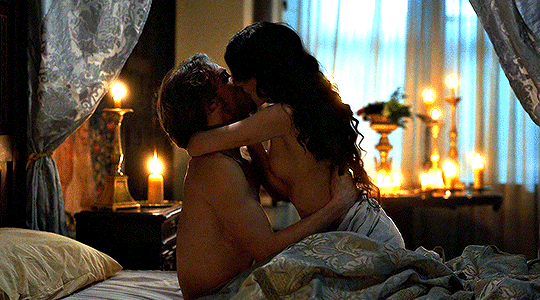

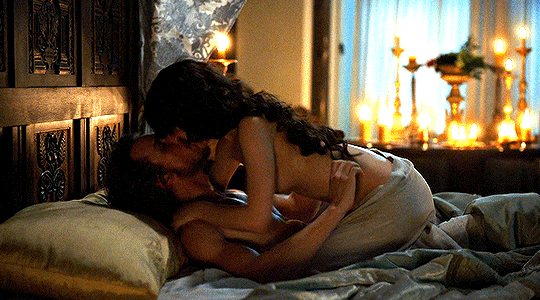




THE SPANISH PRINCESS 2x05: “Plague”
#[ SCREECHING !!!!!!!!! ]#𐩐 ᚌ 。 gentle ruthlessness ── aesthetic.#𐩐 ᚌ 。 gruoch & macbeth ── ♡ it's in your simple steady love.
530 notes
·
View notes
Text
i very much think of how carefree gru was as banfhlaith of fib and mar and how that was sort of snuffed out when she married gille and in falling in love with our boy mcB she found her strength but also her way back to that carefree girl.
0 notes

